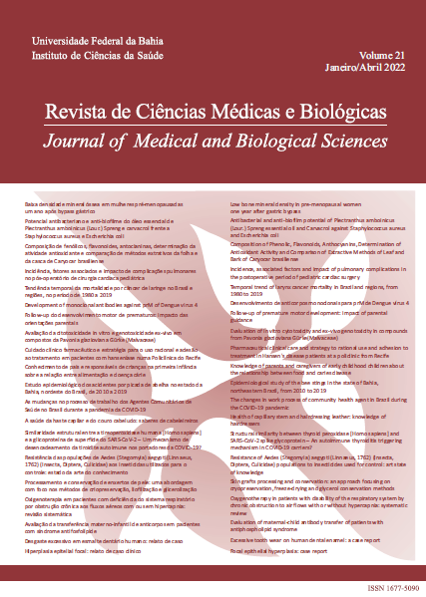Epidemiological study of the bee stings in the state of Bahia, northeastern Brazil, from 2010 to 2019
DOI:
https://doi.org/10.9771/cmbio.v21i1.45286Palavras-chave:
Abelhas. Envenenamento. Saúde Pública. EpidemiologiaResumo
Introduction: envenomation and deaths by bee stings have increased in all regions of Brazil. However, there are few epidemiological studies on them, especially in the states of northeastern Brazil. Objective: to determine the epidemiological characteristics of bee stings in the state of Bahia, Northeastern Brazil, from 2010 to 2019. Methodology: this is a descriptive and analytical epidemiological study conducted through a retrospective survey of secondary data provided by the database of the Notifiable Diseases Information System of the Ministry of Health. Results: between 2010 and 2019, a total of 7,979 cases were analyzed. Incidents were distributed in 356 municipalities, with the highest frequency in the regions of Agreste and Sertão da Bahia. Cases occurred in all months of the investigated years, with a greater occurrence in urban areas, affecting mainly adult men. The anatomical region of the body most affected by the sting was the head and most cases received medical care within 3 hours after the incident. Local manifestations were more frequent than systemic ones. The injuries were predominantly classified as mild and progressed to cure. Conclusions: the high number of cases and their extensive spatial distribution reveal that bee stings may be considered an emerging and neglected public health problem in the state of Bahia.
Downloads
Downloads
Publicado
Como Citar
Edição
Seção
Licença
Copyright (c) 2022 Revista de Ciências Médicas e Biológicas

Este trabalho está licenciado sob uma licença Creative Commons Attribution 4.0 International License.
A Revista de Ciências Médicas e Biológicas reserva-se todos os direitos autorais dos trabalhos publicados, inclusive de tradução, permitindo, entretanto, a sua posterior reprodução como transcrição, com a devida citação de fonte. O periódico tem acesso livre e gratuito.






